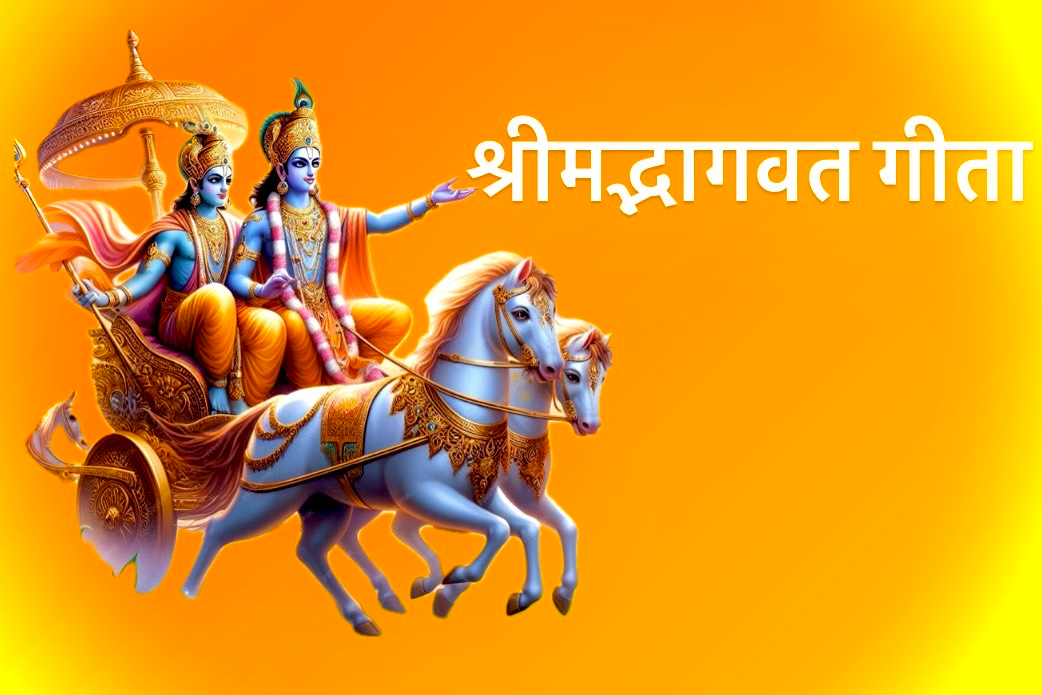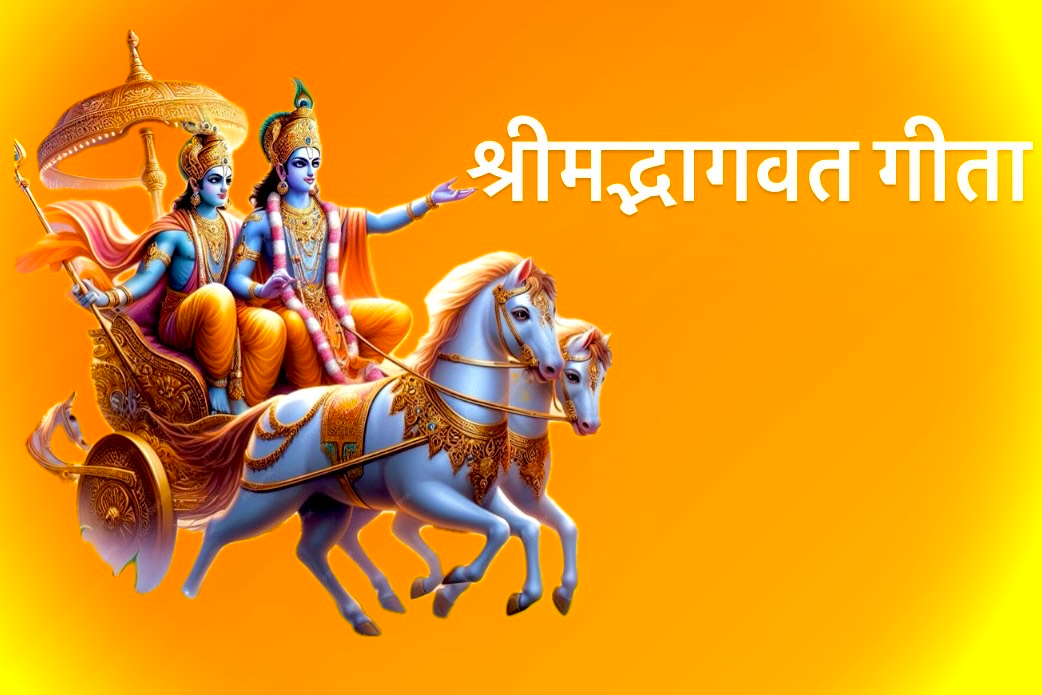श्रीमद् भगवत गीता
३ अध्याय – कर्म योग
४० श्लोक इन्द्रियाणि मनो बुद्धिरस्याधिष्ठानमुच्यते | एतैर्विमोहयत्येष ज्ञानमावृत्य देहिनम् || ४० ||
भावार्थ
इन्द्रिय, मन और बुद्धि को कामना की प्रजनन भूमि कहा जाता है जिनके द्वारा यह मनुष्य के ज्ञान को आच्छादित कर लेती है और देहधारियों को मोहित करती है।
तात्पर्य
काम वासना की शरण स्थली को प्रकट करते हुए भगवान श्रीकृष्ण अब इसे नियंत्रित करने की विधि के संबंध में सूचित करते हैं। शत्रु की घेराबंदी करने से पूर्व शत्रु की दुर्बलता का पता लगाना आवश्यक होता है।
इस श्लोक में श्रीकृष्ण व्यक्त करते हैं कि इन्द्रियाँ, मन और बुद्धि वह स्थान हैं जहाँ से काम वासना आत्मा पर आधिपत्य जमाने का प्रयास करती है।
काम वासना के प्रभाव के अंतर्गत इन्द्रियाँ इन्द्रिय विषय भोगों की कामना करती हैं और इन्द्रियाँ मन को सम्मोहित करती हैं।
काम वासना के प्रभाव के अंतर्गत इन्द्रियाँ इन्द्रिय विषय भोगों की कामना करती हैं और इन्द्रियाँ मन को सम्मोहित करती हैं।
मन बुद्धि को भ्रमित करता है तथा बुद्धि अपनी विवेकी शक्तियाँ खो देती है। जब बुद्धि पर आवरण पड़ जाता है, तब मनुष्य मोहवश होकर वासनाओं का दास बन जाते हैं और उनकी तुष्टि हेतु सब कुछ करने को तत्पर रहते हैं।
इन्द्रियाँ मन और बुद्धि नामक तत्त्व अपने आप में किसी प्रकार से बुरे नहीं होते। यह सब भगवद् प्राप्ति के प्रयोजन हेतु हमें भगवान द्वारा प्रदान किए गये हैं। किन्तु हम काम वासनाओं को इन पर कई रूपों में इनकी घेराबंदी करने की अनुमति देते हैं।
अब हमें इन्हीं इन्द्रियों, मन और बुद्धि को आत्म उत्थान के लिए प्रयोग करना चाहिए। ऐसा किस प्रकार से किया जाए, इसे श्रीकृष्ण अगले श्लोक में स्पष्ट करेंगे।
मन समस्त इन्द्रियों के कार्यकलापों का केन्द्रबिन्दु है, अतः जब हम इन्द्रिय-विषयों के सम्बन्ध में सुनते हैं तो मन इन्द्रियतृप्ति के समस्त भावों का आगार बन जाता है |
इस तरह मन तथा इन्द्रियाँ काम की शरणस्थली बन जाते हैं |
इसके बाद बुद्धि ऐसी कामपूर्ण रुचियों की राजधानी बन जाती है | बुद्धि आत्मा की निकट पड़ोसन है | काममय बुद्धि से आत्मा प्रभावित होता है
जिससे उसमें अहंकार उत्पन्न होता है और वह पदार्थ से तथा इस प्रकार मन तथा इन्द्रियों से अपना तादात्मय कर लेता है | आत्मा को भौतिक इन्द्रियों का भोग करने की लत पड़ जाती है जिसे वह वास्तविक सुख मान बैठता है |
श्रीमद्भागवत में (१०.८४.१३)
आत्मा के इस मिथ्या स्वरूप की अत्युत्तम विवेचना की गई है – यस्यात्मबुद्धिः कृणपे त्रिधातुके स्वधीः कलत्रादिषु भौम इज्यधीः | यत्तीर्थबुद्धिः सलिले न
कर्हिचिज्जनेष्वभिज्ञेषु स एव गोखरः || “जो मनुष्य इस त्रिधातु निर्मित शरीर को आत्मस्वरूप जान बैठता है, जो देह के विकारों को स्वजन समझता है, जो जन्मभूमि को पूज्य मानता है और जो तीर्थस्थलों की यात्रा दिव्यज्ञान वाले पुरुष से भेंट करने के लिए नहीं,
अपितु स्नान करने के लिए करता है उसे गधा या बैल के समान समझना चाहिए |”
PURPORT
Shree Bhagavān states “Therefore, first control the senses, O excellent among Bharatās, and with force, definitely kill this destroyer of knowledge and wisdom.” Now, Sri Krsna explains how to overcome lust,
the root of all evil, which is so pernicious to human consciousness.
Having identified the repositories of lust, Sri Krsna asks Arjuna, at the outset, to curb the desires of the senses. Permitting them to arise is the cause of our miseries, while eliminating them is the way to peace.
Consider the following example.
Ramesh and Dinesh were two fellow students sharing the same room in the hostel. At 10 pm at night, Ramesh developed the desire to smoke cigarettes. He said,
“I am getting the urge to smoke.” Dinesh replied, “It is so late at night. Forget about cigarettes and go to sleep.” “No…no…I will not be able to sleep until I puff the tobacco,
” said Ramesh. Dinesh went to sleep, but Ramesh went out in search of cigarettes. The shops nearby had closed. It took him two hours until he finally returned to the hostel with the cigarette and had a smoke.
In the morning, Dinesh asked him, “Ramesh, when did you sleep at night?” “At midnight.” “Really! That means you remained agitated for cigarettes for two hours and when you had your puffs,
you returned to the same state that you were in at 10 pm.” “What do you mean by that?” asked Ramesh. “Look, at 10 pm you did not have any desire for cigarettes,
and you were peaceful. Then you yourself created the desire for them. From 10 pm to midnight, you remained agitated for cigarettes. Finally,
when you smoked them, the disease, which you had created, went away, and you got to sleep. I, on the other hand, did not create any desire,
and slept peacefully at 10 pm itself.” In this way, we create desires for the objects of the senses of the body, and then become agitated by them. When we get the cherished object,
the disease of our own creation gets eradicated, and we think of it as happiness.” However, if we think of ourselves as the soul and our only purpose is happiness of the soul,
then it becomes easier to renounce such material desires. The Lord advised Arjuna to regulate the senses from the very beginning so that he could curb the greatest sinful enemy,
lust, which destroys the urge for self-realization, and specifically, knowledge of the self. Sri Krsna tells Arjuna to bring the senses under control, thereby slaying the lust residing in them.
To accomplish this we must use the higher instruments given by God to us, as stated in the next verse.



This article offers a deep exploration of the timeless wisdom found in the Bhagavad Gita, providing valuable spiritual insights.
Thank-you for your valuable feedback